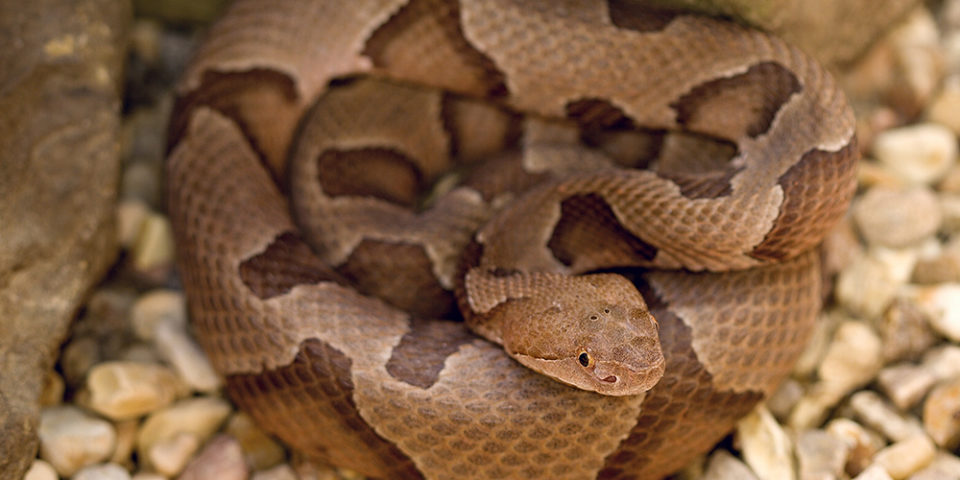How common are snake and spider bites?
We’ve all heard stories of venomous spider or snake bites leading to severe illness or injury, but how common are snake and spider bites, exactly? Emergency medicine physician Nathaniel Mann, MD, explained that while your chances of being bitten by a venomous snake or spider is low, you should still be prepared to recognize and treat these bites and know when to seek medical care.
“While snakes and spiders are more or less everywhere and we often come into at least some contact with them, there are only a handful of species that can cause any real harm to humans,” said Dr. Mann.
It isn’t often easy to know which snakes or spiders are venomous and which aren’t by sight, so it’s important to leave all of them alone if possible. Emergency departments in South Carolina see dozens of patients each year after venomous bites. Often the cause for these bites is the bitten person unnecessarily attempting to physically handle or touch the snake.
Can you prevent snake and spider bites?
“The best way to prevent being bitten by a spider or snake is to avoid them entirely,” said Dr. Mann. “Of course, this isn’t always possible, so there are a few other steps you can take to prevent yourself from bites.”
A snake typically doesn’t bite unless it feels threatened, and so often preventing bites is as simple as never trying to handle a wild snake. Since it is possible to walk on or over a snake without seeing it, as many snakes are excellently camouflaged in their natural environments, Dr. Mann also recommended wearing long pants with high-top shoes or boots that cover the ankle. Snakes do not often bite above that height.
Crawl spaces are common places where you’ll find all sorts of wildlife, snakes and spiders being no exception. If you’re working in an area like a crawl space that a snake or spider might inhabit, do your best to check the area thoroughly for anything that might be present.
Can you kill a snake you find under your home?
“Snakes play a very important role in the local ecosystem and in maintaining our environment,” said Dr. Mann. “We do not encourage the unnecessary killing of any snakes, as they provide more help than harm to humans.”
Common snakes like the black snake or garden snake are known to help keep down the numbers of pests like mice that might otherwise carry harmful diseases into your home. If you see a snake from afar, leave it be!
The most likely result is that the snake will go on its way without causing any harm to humans nearby.
Similarly, most spiders are not venomous. Species like the Golden Orb Weaver control insect populations and are harmless to humans, even if they seem large and unsightly.
Is it easy to tell if you’ve been bitten by a snake or spider?
“The experience of being bitten by a snake, and how it looks and feels, make it more obvious when you’re dealing with a snake bite than when it comes to spider bites,” said Dr. Mann. “Most patients know when they’ve been bitten by a venomous snake. The exceptions might be in poor visual conditions, like late at night or in high grass, or under certain circumstances such as someone being intoxicated or unconscious at the time of the bite.”
With spiders, however, it can sometimes be very difficult to know you have a spider bite at all, since they often look the same as bites from insects like mosquitoes. Even bites from venomous spiders like the widow spider often resolve on their own with only local and relatively mild symptoms. Of the four kinds of venomous spiders in South Carolina, the widow spider makes up three of them.
Bites from the brown recluse are often considered concerning because of their reputation for causing severe and lasting tissue damage, but these spiders are rare in South Carolina and severe complications are uncommon.
What should you do if you’ve been bitten by a snake or spider?
“Initial treatment for all spider bites is the same,” said Dr. Mann. “That involves cleaning the wound; consider applying an antibacterial cream or a fresh and clean bandage.”
For minor spider bites, simply keeping the wound clean and bandaged and keeping an eye on it is often enough, due to the rarity of severe complications. Anti-itch creams and painkillers like ibuprofen can help to minimize discomfort while you heal.
However, if you have symptoms like pain in the chest, muscles, or abdomen, nausea and vomiting, or other signs of systemic effects, seek medical care right away. If you remember anything about the spider’s appearance or can name where you were when you were bitten, this can help doctors to know what type of spider you were bitten by.
If you’re concerned you might have been bitten by a venomous snake, try to keep the bitten area as immobile as possible and seek emergency medical care right away. Receiving early treatment by professionals in an emergency department is the best possible care, and will give you the best chance at recovery as soon as possible.
What should you NOT do if bitten by a spider or snake?
“Don’t try to catch or approach any snake or spider that has bitten you,” said Dr. Mann. “This could result in additional bites without providing any specific benefit for your treatment.”
What does help is any photos or descriptions of the snake or spider you can provide.
Regardless of the situations or the symptoms you are experiencing, do not try to ‘suck out’ the venom or cut the skin to ‘bleed’ the venom from the wound. This isn’t effective and can make the site of the bite more prone to infection.
Similarly, applying ice, shocking the wound, or applying a tourniquet will not help and could cause more harm or complicate future treatment options.
How are bites from venomous snakes or spiders treated?
“Bites by a venomous snake require immediate medical attention,” said Dr. Mann. “Antivenom given by a professional might be required to prevent serious complications and to recover from the bite. Even with antivenom, some patients have serious complications, which is why prompt emergency medical care is so important.”
Even if antivenom isn’t needed, medical observation is usually recommended, and additional treatments and therapies may be offered to help things heal as quickly and cleanly as possible without complications.
For spider bites, observation and basic wound cleaning is usually all that is needed.
Find the care you need, close to home
Our primary care physicians provide well visits and everyday care when you need it with compassion and expertise.
Find Primary Care Near You

